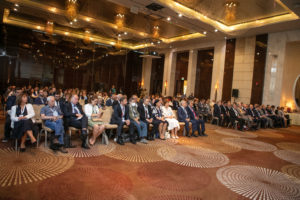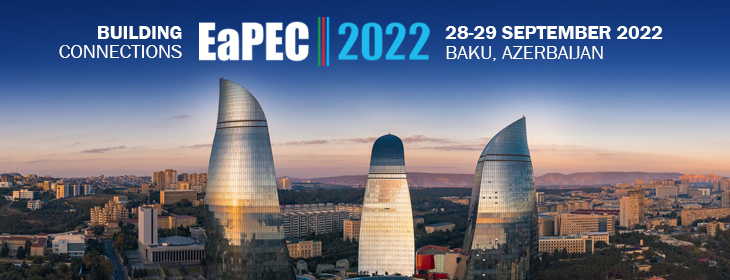 In the packed conference hall of the Marriott Absheron Hotel in Baku over 200 delegates from scientific institutions from Azerbaijan, the EaPConnect member countries and beyond, gathered for the opening plenary ceremony where Azerbaijani government representatives, senior management from the Azerbaijan National Academy of Sciences (ANAS), EC delegation, DG NEAR representatives and GÉANT colleagues were invited on stage for the welcome address.
In the packed conference hall of the Marriott Absheron Hotel in Baku over 200 delegates from scientific institutions from Azerbaijan, the EaPConnect member countries and beyond, gathered for the opening plenary ceremony where Azerbaijani government representatives, senior management from the Azerbaijan National Academy of Sciences (ANAS), EC delegation, DG NEAR representatives and GÉANT colleagues were invited on stage for the welcome address.
Arif Hashimov, Acting President of ANAS opened: ‘EaPEC 2022 will accelerate the integration of the scientific community of Azerbaijan into the European environment, as well as allow Azerbaijani scientists to conduct joint research with foreign colleagues and universities and strengthen international scientific cooperation’.
Erik Huizer, CEO of GÉANT, in his brief address included some recommendations: using the expertise of AzScienceNet to create a unified network for Research & Education (R&E) in Azerbaijan, taking a proactive approach in becoming more sustainable and increasing the uptake of the services available in the international GÉANT Community for the benefits of R&E in the country.
“Hosting EaPEC 2022 in Azerbaijan will open wide opportunities for researchers in our country, continued Firudin Gurbanov, Deputy Minister of Science and Education.
His intervention was followed by Samir Mammadov, Deputy Minister of Digital Development and Transport: ‘What will be presented and discussed at EaPEC 2022 in the next two days will undoubtedly give a serious impetus to the expansion of scientific relations between Azerbaijan and Europe’.
Victor Bojkov, Head of Cooperation Section, Delegation of the European Union to Azerbaijan commented: ‘The EaPConnect project builds on strong partnership and plays a key role for the digital transformation and development of the digital economy in Azerbaijan, which is one of the government’s main strategic objectives’.
Thibault Charlet, Programme Manager, Digital and Economic Cooperation with Eastern Partnership countries, DG NEAR, European Commission added: ‘Building a brighter future together, a resilient economy and the digital transformation are the objectives of the renewed agenda for the EaPConnect region. Our focus is on infrastructure and people: providing affordable and secure high speed connectivity in the region and connecting people. In order to achieve digital transformation we need to build on a unified ecosystem to ensure that innovation flows across all sectors of the economy’.
The EaPConnect project delivers resources for important outcomes focussed on the expansion of infrastructure to ensure that scientific exchange and knowledge can be scaled up, to make research and education communities stronger and to communicate at national and international level. In Azerbaijan data traffic increased 6-fold since the start of the project and doubled in the last two years as more people and institutions use the network in the country. Network infrastructure is important as it ensures sustainability and growth, connectivity itself doesn’t have an impact, but the available services and how they are used make an impact.
Rasim Alguliev, Vice President of ANAS talked about the full renovation of the e-infrastructure in the country and the deriving benefits since joining the EapConnect project: ‘Today, the main issues faced by Azerbaijani scientists, teachers and students is not access to the internet, but qualitative scientific and educational online content to reduce the knowledge gap with the rest of Europe.’
The conference continued with sessions on e-learning, open science, cybersecurity and big data; all talks registered active audience participation and involvement in busy and informative Q&A sessions. Here are some highlights.
In the e-learning session Sara Di Giorgio from the Italian NREN GARR, presented SKILLS4EOSC, a new ambitious project: a training ecosystem for Open and FAIR science in Europe. Ans ter Woerds, from SURF talked about the National Digitization Impulse Programme which is “inspired by the wish that universities should take back control of education”. The programme’s main objective is to build a knowledge infrastructure as a source of knowledge and local centres to develop teaching and learning. Eli Shmueli, from IUCC MEITAL, from Israeli started his talk How can NRENs accelerate the Adoption of Learning Technologies: “Our primary objective is to promote an advanced learning technology in higher education in Israel through national and international collaboration to make sure that universities can adapt to 21st century technologies”.
In the Open Science session Mehmet Mirat Satoglu, Director of TÜBİTAK ULAKBIM in Turkey, spoke about the adoption process of Open Science in the country highlighting concerns, questions and his organisation’s experience in providing research e-infrastructure, and summarised their plans for the next 10 years. Zisis Kozlakidis from IARC talked about the promotion of Open Science from an institutional and inter-governmental perspective: “Open Science is a policy priority for the European Commission and it improves the quality, efficiency and responsiveness of research”. Babak Nabiyev Head of the AzScienceNet NOC shared an update on the stages of development of the national R&E network’s technical capabilities, on the connected research institutes and universities, and the services provided to users, highlighting the benefits of being connected to the GÉANT community.
All presentations can be downloaded from the EaPEC 2022 conference website and the conference recordings are available on the GÉANT YouTube Channel


